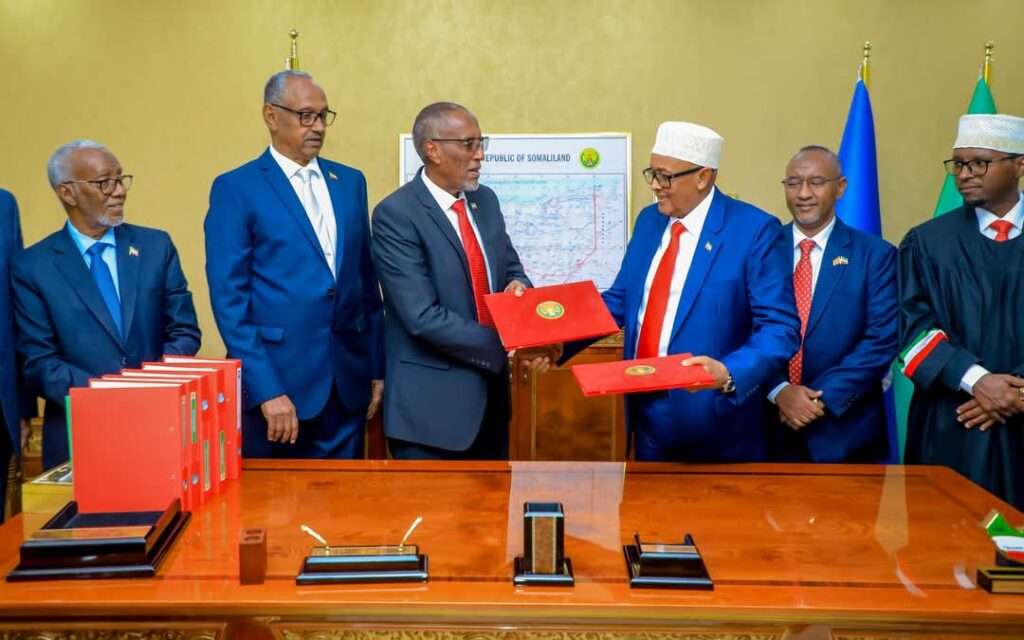Abdirahman Mohamed Abdullahi, the newly elected president of Somaliland, took office on Thursday, pledging to strengthen foreign policy and accelerate the region’s long-standing campaign for international recognition.
The inauguration ceremony in Hargeisa marked a significant political transition following Abdullahi’s victory in last month’s presidential election.
In his inaugural speech, Abdullahi, a former opposition leader, emphasized the region’s “valid legal argument” for sovereignty, highlighting his administration’s commitment to achieving formal statehood. “Our case is strong, and our people’s aspirations for recognition are legitimate,” he declared.
Somaliland, which seceded from Somalia more than three decades ago, operates with its own government, currency, and security forces.
Despite its stability and relatively peaceful governance, it remains unrecognized by the African Union, the United Nations, or any individual nation. Somalia continues to regard the region as an integral part of its territory.
Over the years, Somaliland has drawn international attention for its democratic processes, standing in contrast to Somalia’s struggles with insecurity and frequent al-Shabab militant attacks.
The recent presidential election further bolstered this reputation, with Abdullahi of the opposition Waddani Party securing over 50% of the vote. His win marked a decisive defeat for incumbent Muse Bihi Abdi, who sought a second term after seven years in office.
The electoral commission lauded the high voter turnout and peaceful transition, describing it as a “testament to Somaliland’s democratic resilience.”

Tensions Over Ethiopia Deal
Abdullahi’s administration inherits complex challenges, including internal unrest in Somaliland’s Sool region and a divisive agreement with neighboring Ethiopia.
In January, Somaliland signed a memorandum of understanding with Ethiopia, allowing the latter to lease land along Somaliland’s coastline for a marine base in exchange for recognizing its independence. The deal provoked strong opposition from Somalia, which viewed it as a violation of its sovereignty.
During his campaign, Abdullahi criticized the agreement for its lack of transparency, pledging to reassess such arrangements to ensure they align with Somaliland’s strategic goals. “All deals must reflect the aspirations of our people and our unwavering pursuit of recognition,” he said.
The Ethiopia deal remains a contentious issue, as Somalia and Ethiopia recently agreed in Turkey to hold “technical talks” aimed at resolving disputes over Somaliland’s future status.
Abdullahi, 69, enters office at a pivotal moment for Somaliland. His administration faces the dual task of resolving domestic challenges while advancing its bid for international recognition.
The inauguration ceremony drew diplomatic attention, with U.S. Ambassador to Somalia Richard H. Riley congratulating Somaliland on its electoral success. “The people of Somaliland have set an example of democracy not only for this region but for Africa and the world. We are proud to be your friends and partners for the future,” Riley stated.
While recognition remains elusive, Abdullahi’s leadership signals a renewed push for legitimacy on the global stage. His promise to review agreements like the Ethiopia deal reflects his focus on safeguarding Somaliland’s sovereignty while building constructive regional partnerships.
As Somaliland seeks greater international engagement, its ability to maintain stability, resolve internal conflicts, and project a unified vision for statehood will be critical. Abdullahi’s tenure may define the next chapter in its decades-long struggle for recognition.
READ ALSO: Ghanaians Reject Corruption, Incompetence, and Arrogance- Kennedy



















